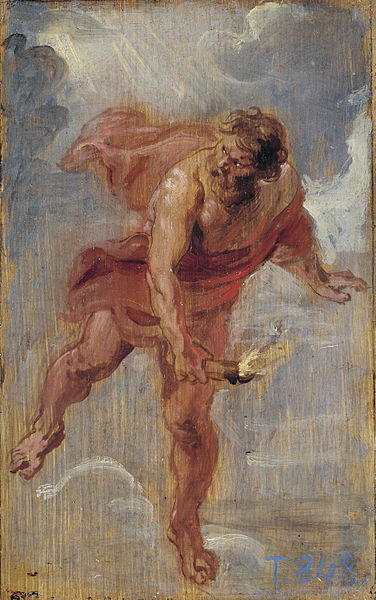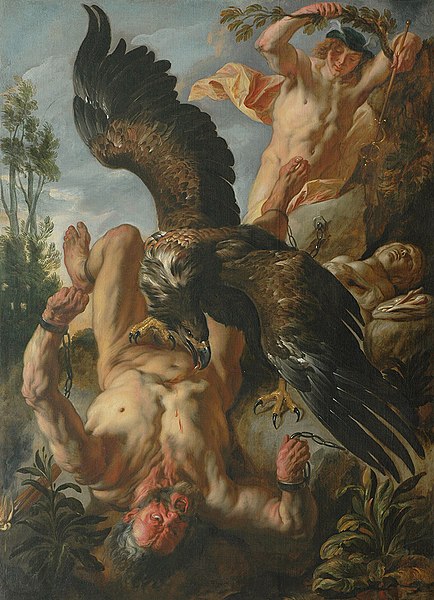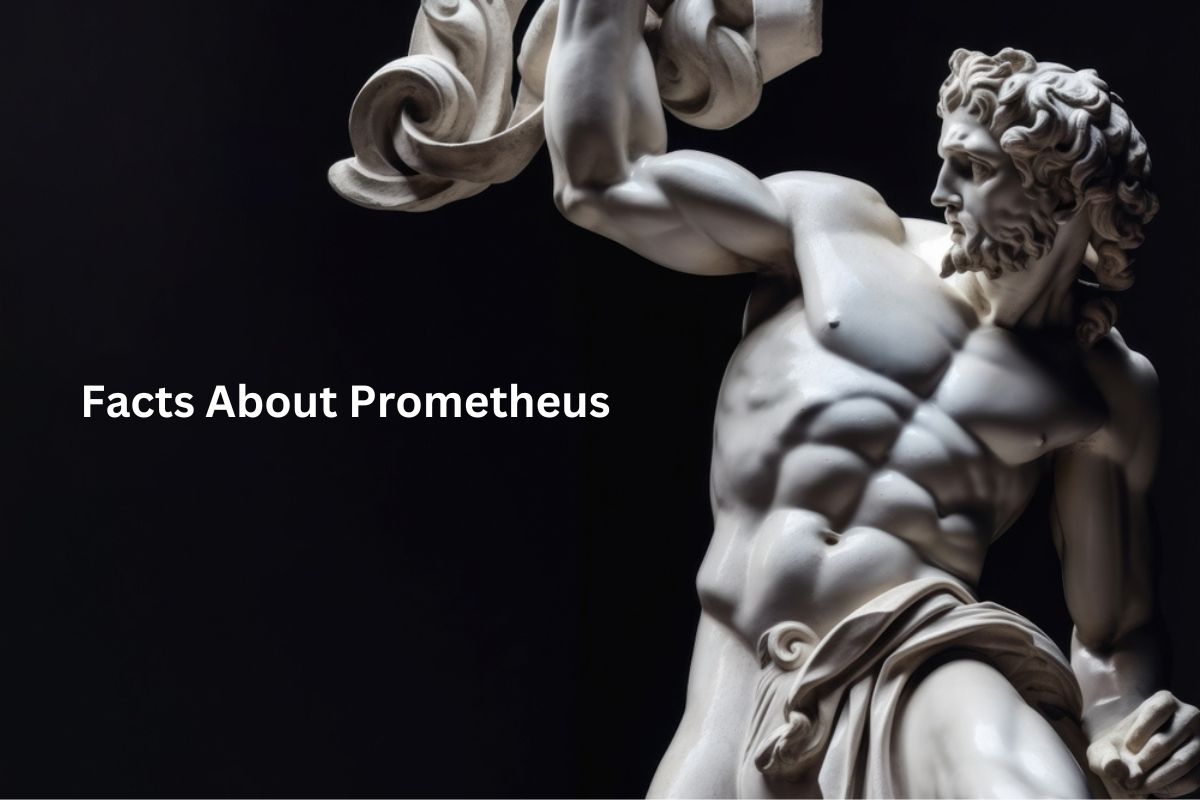Prometheus is a prominent figure in Greek mythology, best known for his daring act of stealing fire from the gods and giving it to humanity. As a Titan, he possessed great intellect and resourcefulness.
The name “Prometheus” itself signifies his role as a forethinker and strategic planner. Besides granting fire to humans, Prometheus is also credited with creating humanity, molding the first humans out of clay.
However, his audacious actions incurred the wrath of Zeus, resulting in a punishment where he was bound to a rock and tormented by an eagle devouring his liver.
Prometheus’s story symbolizes human progress, the acquisition of knowledge, and the enduring quest for freedom and innovation. It has been immortalized in various artistic and literary works, serving as a timeless inspiration for generations.
Prometheus Facts
1. Prometheus is a figure in Greek mythology
Prometheus holds a significant place in Greek mythology. He is known for his role in the mythological narrative of the Titans, who were powerful divine beings that predated the Olympian gods.
Also Read: Facts About Pandora
Prometheus’s story has been passed down through generations, often highlighting his defiance and his contributions to humanity.

2. He stole fire from the gods and gave it to humans
One of Prometheus’s most famous acts was stealing fire from the gods and bringing it to humanity. In Greek mythology, fire was seen as a divine element reserved for the gods.
Also Read: Theseus Facts
By giving fire to humans, Prometheus empowered them with a valuable tool that allowed progress, civilization, and technological advancements to take place. This act elevated Prometheus to a heroic figure and a symbol of human ingenuity and resourcefulness.
3. Prometheus was a Titan, son of Iapetus and Clymene
Prometheus belonged to the race of Titans, a group of powerful and primordial beings in Greek mythology. His parents were Iapetus, one of the Titans, and Clymene, an Oceanid, a nymph associated with the ocean.
As a Titan, Prometheus possessed great strength and intellect, which he often used to challenge and outwit both gods and mortals. His lineage as a Titan further solidifies his status as a prominent figure in Greek mythology.
4. His name means “forethought” or “forethinker” in Greek
The name “Prometheus” carries significant meaning in Greek. It is derived from the Greek words “pro” (meaning “before” or “in advance”) and “manthano” (meaning “to think” or “to learn”). Thus, Prometheus’s name can be interpreted as “forethought” or “forethinker.”
This name reflects his reputation for being clever, resourceful, and possessing the ability to foresee events, making him a symbol of strategic thinking and foresight.
5. Prometheus created humanity and molded the first humans out of clay
In addition to his act of stealing fire, Prometheus is credited with the creation of humanity in Greek mythology. According to one myth, he shaped the first humans out of clay or earth.
Prometheus took on the role of a divine craftsman, carefully molding the physical forms of humans and breathing life into them. This act of creation further emphasizes Prometheus’s connection to humanity and his role as a benefactor.

6. Zeus punished Prometheus by chaining him to a rock and having an eagle eat his liver every day
Prometheus’s audacious act of stealing fire from the gods angered Zeus, the king of the gods. As a punishment, Zeus ordered Prometheus to be bound to a rock in the Caucasus Mountains.
There, an eagle or vulture (in different versions of the myth) was sent by Zeus to devour Prometheus’s liver every day.
Prometheus was immortal, so his liver would regenerate overnight, subjecting him to eternal torment. This punishment serves as a reminder of the consequences of defying the gods and the enduring nature of Prometheus’s suffering until his eventual liberation.
7. Heracles (Hercules) eventually freed Prometheus from his torment
As a hero known for his strength and courage, Heracles was destined to free Prometheus from his torment.
In Greek mythology, Heracles was commanded by Zeus to undertake twelve labors as a form of punishment. One of these labors was to free Prometheus from his eternal suffering. With his immense strength and determination, Heracles journeyed to the Caucasus Mountains, where Prometheus was bound.
Upon reaching the mountain, Heracles encountered the tormenting eagle or vulture that daily devoured Prometheus’s regenerating liver. With his trusty bow and arrow, Heracles aimed and shot the creature, bringing an end to Prometheus’s torment.
Witnessing Heracles’ act of bravery, Zeus ultimately decided to release Prometheus from his chains. The hero’s valor and the fulfillment of his labor symbolize the triumph of mortal will and compassion over divine punishment.
The liberation of Prometheus by Heracles signifies the potential for redemption, forgiveness, and the breaking of cycles of suffering. It represents the recognition of Prometheus’s significant contributions to humanity and the acknowledgment of his enduring spirit and resilience.
8. Prometheus symbolizes human progress and the acquisition of knowledge
His act of stealing fire from the gods and giving it to humanity represents the transformative power of knowledge and innovation. Fire, in this context, symbolizes not only literal fire but also the broader concept of knowledge, technology, and enlightenment.
By bestowing fire upon humanity, Prometheus enabled civilization to advance. Fire brought warmth, light, and the ability to cook food, leading to improved living conditions and expanded possibilities. It sparked the development of various industries, arts, and sciences, propelling human progress forward.
Prometheus’s defiance of the gods reflects the human desire to challenge limits, push boundaries, and seek new horizons. His actions embody the courage to question authority, to explore the unknown, and to challenge established norms in the pursuit of knowledge and advancement.
9. He is associated with the arts and sciences
Prometheus is often portrayed as a patron of craftsmen, artists, and scientists. In Greek mythology, he was believed to have taught humans various skills and techniques, ranging from metalworking and agriculture to mathematics and astronomy.
Prometheus’s association with the arts and sciences highlights his role as a guiding figure, inspiring human creativity and intellectual pursuits.
10. Prometheus’s story has inspired various works of art, literature, and music
Throughout history, the myth of Prometheus has captivated the imaginations of artists, writers, and musicians. From ancient times to the present day, Prometheus has been a subject of numerous works of art, literature, and music.
His story has inspired renowned works like Mary Shelley’s novel “Frankenstein,” Percy Bysshe Shelley’s poem “Prometheus Unbound,” and countless other creative endeavors. The enduring popularity of Prometheus’s story reflects its universal themes of rebellion, sacrifice, and the indomitable spirit of humanity.
